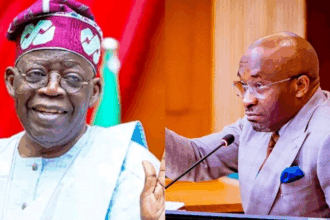Joe Igbokwe, a chieftain of All Progressives Congress in Lagos State, has stated that the adoption of indirect primary by the ruling All Progressive Congress to decide its presidential candidate is a better option for frontline presidential aspirant, Bola Tinubu.
According to Igbokwe, the National Leader of the APC will easily defeat all other contestants of the election.
ATTENTION: Click “HERE” to join our WhatsApp group and receive News updates directly on your WhatsApp!
He stated this following the conclusion of the National Executive Council meeting of the APC in Abuja, on Wednesday.
The NEC led by Abdullahi Adamu ruled out the option of using consensus to select its presidential candidate as it settled for indirect the primary model.
Igbokwe, an aide to Lagos State Government, Babajide Sanwo-Olu, said Tinubu would floor co-contenders in the election because of his “deep structures”.
He said, “Indirect means that it is open and then you go to convention and the delegates will vote. Let’s wait and see, Asiwaju (Tinubu) will beat them. If they do it the other way (consensus), the Presidency can buy everything for somebody.
“The indirect primary is better for Asiwaju and it is going to weed off those boys that are looking for somebody to settle them that they want to be President. It’s going to clear the unserious people. Either way, Asiwaju is on the ground.”
In the option of indirect primary, party members will be made to elect delegates who will further elect party’s candidates on their behalf.
According to the APC, it has about 7,800 delegates across the country, who will participate in the primary election.
Bola Tinubu faces opposition from notable aspirants like Vice President Yemi Osibanjo, Governor Yahaya Bello of Kogi State, Minister of Transport, Rotimi Amaechi, Senator Rochas Okorochas, among others.

